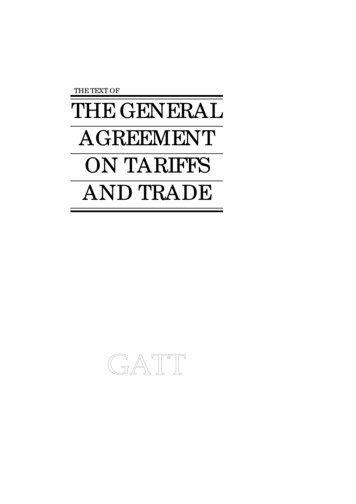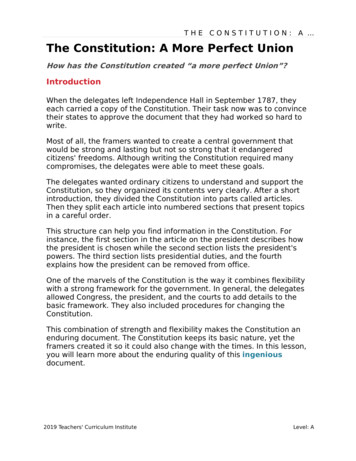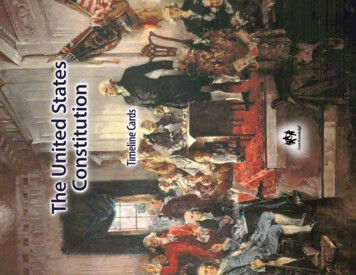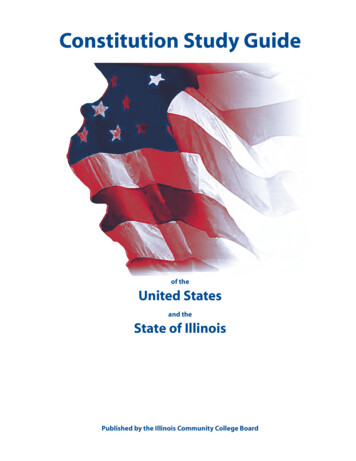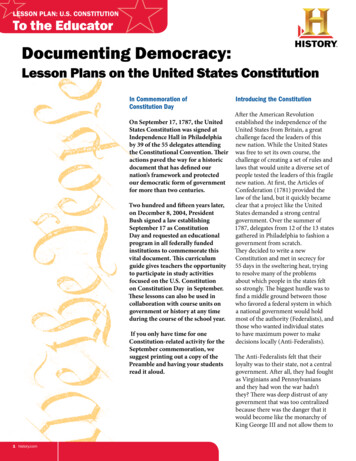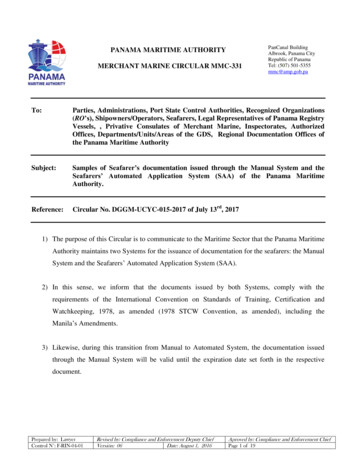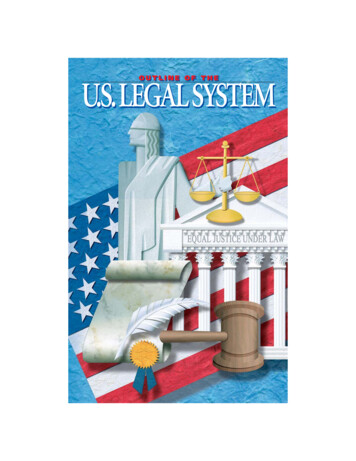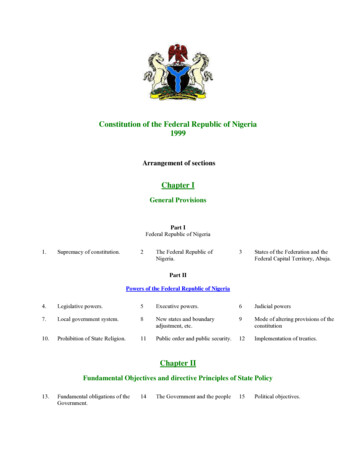
Transcription
Constitution of the Federal Republic of Nigeria1999Arrangement of sectionsChapter IGeneral ProvisionsPart IFederal Republic of Nigeria1.Supremacy of constitution.2The Federal Republic ofNigeria.3States of the Federation and theFederal Capital Territory, Abuja.Part IIPowers of the Federal Republic of Nigeria4.Legislative powers.5Executive powers.6Judicial powers7.Local government system.8New states and boundaryadjustment, etc.9Mode of altering provisions of theconstitution10.Prohibition of State Religion.11Public order and public security.12Implementation of treaties.Chapter IIFundamental Objectives and directive Principles of State Policy13.Fundamental obligations of theGovernment.14The Government and the people15Political objectives.
16.Economic objectives.17Social objectives.18Educational objectives.19.Foreign policy objectives.20.Environmental objectives.21.Directive on Nigeria cultures22.Obligation of the mass media23.National ethics.24.Duties of the citizen.Chapter IIICitizenship25.Citizenship by birth.26Citizenship by registration.27Citizenship by naturalisation.28.Dual citizenship.29Renunciation of citizenship.30Deprivation of citizenship.31.Persons deemed to be Nigeriancitizens.32Power to make regulations.Chapter IVFundamental Rights33.Right to life.34Right to dignity of humanpersons.35Right to personal liberty.36.Right to fair hearing.37Right to private and family life.38Right to freedom of thought,conscience and religion39.Right to freedom of expressionand the press.40Right to peaceful assembly andassociation.41Right to freedom of movement.42Right to freedom fromdiscrimination.43Right to acquire and ownimmovable property.44Compulsory acquisition of property.45Restriction on and derogationfrom fundamental human rights.46Special jurisdiction of HighCourt and Legal aid.49Composition of the House ofRepresentatives.Chapter VThe LegislaturePart INational AssemblyA-Composition and Staff of National Assembly47Establishment of NationalAssembly.48Composition of the Senate50President of the senate and51Staff of the National Assembly.
speaker of the House ofRepresentatives.B-Procedure for Summoning and Dissolution of National Assembly52Declaration of assets andliabilities ;oath of members.53Presiding at sitting of theNational Assembly and at alified person sitting or voting.58Mode of exercising FederalLegislative power: general59Mode of exercising FederalLegislative power: money bills.60Regulation of procedure61Vacancy or participation ofstrangers not to lution and issue ofproclamations by president.C - Qualifications for Membership of National Assembly and Right of Attendance65Qualifications for election66Disqualifications67Right of attendance of President68Tenure of Seat of Members69Recall70RemunerationD - Elections to National Assembly71Senatorial districts and Federalconstituencies72Size of Senatorial districts andFederal constituencies.73Periodical review of Senatorialdistricts and Federal constituencies74Time when alteration ofsenatorial districts or Federalconstituencies takes effects.75Ascertainment of population76Time of Election to the NationalAssembly77Direct Election and franchise78Supervision of election79Power of the National Assembly asto determination of certainquestions.E - Powers and Control over Public Funds80Establishment of ConsolidatedRevenue Fund81Authorisation of expenditurefrom Consolidated RevenueFund82Authorisation of expenditure indefault appropriations83Contingencies Fund84Remuneration, etc. of thePresident and certain otherofficers85Audit of Public accounts86Appointment of Auditor-General87Tenure of office of AuditorGeneral88Power to conduct investigations
89Power as to matters of evidencePart IIHouse of Assembly of a StateA - Composition and Staff of House of Assembly90Establishment of House ofassembly for each State93Staff of house of Assembly91Composition of the House ofAssembly92Speaker of House of AssemblyB - Procedure for Summoning and Dissolution of House of Assembly94Declaration of assets andliabilities; oaths of members95Presiding at sittings96Quorum97Languages98Voting99Unqualified person sitting or voting100Mode of exercising legislativepower of a state101Regulation of procedure102Vacancy or participation of strangersnot to invalidate proceedings.103Committees104Sittings105Dissolution and issue ofproclamation by GovernorC - Qualification for Membership of House of Assembly and Right of Attendance106Qualifications for election107Disqualifications108Right of attendance of President109Tenure of Seat of Members110Recall111RemunerationD - Elections to a House of Assembly112State constituencies113Size of state constituencies114Periodical review of Stateconstituencies115Time when alteration of stateconstituencies takes effect116Time of elections to Houses ofAssembly117Direct election and franchise118Supervision and election119Power of National Assembly asto determination of certainquestionsE - Powers and control over Public Funds
120Establishment of ConsolidatedRevenue Fund121Authorisation of expenditurefrom Consolidated Revenuefund122Authorisation of expenditure indefault of appropriations.123Contingencies Fund124Remuneration, etc. of thegovernor and certain otherofficers125Audit of Public accounts126Appointment of Auditor-General127Tenure of office of AuditorGeneral128Power to conduct investigations129Power as to matters of evidence.Chapter VIThe ExecutivePart IFederal ExecutiveA-The President of the Federation130Establishment of the office ofPresident131Qualification for election asPresident132Election of the President: general133Election: single presidentialcandidate134Election: two or morepresidential candidates135Tenure of office of President136Death, etc. of president-electbefore oath of office.137Disqualifications.138President: disqualification fromother jobs.139Determination of certainquestions relating to election140Declaration of assets andliabilities; oaths of President.141Establishment of office of VicePresident142Nomination and election ofVice-President143Removal of President fromoffice144Permanent incapacity of President orVice-President.145Acting President duringtemporary absence of President146Discharge of functions ofPresident147Ministers of federal Government148Executive Responsibilities ofMinisters149Declaration of Assets andliabilities; oaths of Ministers.150Attorney-General of the Federation151Special Advisers.152Declaration of assets andLiabilities; oaths of specialAdviser.B - Establishment of Certain Federal Executive Bodies
153Federal Commissions andCouncils, etc.154Appointment of Chairman andmembers155Tenure of office of members.156Qualification for membership.157Removal of members.158Independence of certain bodies159Quorum and decisions160Powers and Procedure.161Interpretation.C - Public Revenue162Distributable pool account163Allocation of other revenues164Federal grants-in-aid of Staterevenue.165Cost of collection of certainduties166Set-off.167Sums charged on consolidatedRevenue Fund.168Provisions with regard topaymentsD - The Public Service of the Federation169Establishment of civil service ofthe Federation170Federal Civil serviceCommission: power to delegatefunctions171Presidential appointments172Code of Conduct173Protection of pension rights.174Public persecutions175Prerogative of mercy.Part IIState ExecutiveA - The Governor of a State176Establishment of office ofGovernor177Qualification for election asGovernor178Election of Governor: general.179Election: single candidate andtwo or more candidates180Tenure of office of Governor181Death, etc. of Governor before oathof office.182Disqualifications183Governor: disqualification fromother jobs.184Determination of certain questionsrelating to elections.185Declaration of assets andliabilities; oaths of office of186Establishment of the office ofthe Deputy Governor187Nomination and election of theDeputy Governor
Governor.188Removal of Governor or DeputyGovernor from office.189Permanent incapacity ofGovernor or Deputy Governor.190Acting governor during temporaryabsence of Governor.191Discharge of functions ofGovernor.192Commissioners of StateGovernment.193Executive responsibilities of DeputyGovernor and Commissioners.194Declaration of assets andliabilities; oaths ofCommissioners195Attorney-General of a State196Special AdvisersB - Establishment of Certain State Executive Bodies197State Commissioners198Appointment of Chairman andmembers.199Tenure of office of the members.200Qualification for membership201Removal of members.202Independence of certain bodies.203Quorum and decisions.204Powers and procedure205InterpretationC - The Public Service of State206Establishment of State CivilService207State Civil Service Commission:Power of delegation208Appointments by Governor209Code of Conduct.210Protection of pension rights.211Public prosecutions212Prerogative of mercy216Delegation of powers to theInspector-General of PolicePart IIISupplementalA - National Population Census213National Population censusB - Nigeria Police Force214Establishment of Nigeria PoliceForce.215Appointment of InspectorGeneral and control of NigeriaPolice Force.
C - Armed Forces of the Federation217Establishment and compositionof the armed force of theFederation220Compulsory military service.218Command and operational use219Establishment of body to ensurefederal character of armed forcesD - Political Parties221Prohibition of political activitiesby certain associations.222Restrictions on formation ofpolitical parties223Constitution and rules of politicalparties.224Aims and objectives225Finances of political parties.226Annual reports on finances227Prohibition of quasi-militaryorganisations.228Powers of the national assemblywith respect to political parties.229Interpretation.Chapter VIIThe JudicaturePart IFederal CourtsA - The Supreme Court of Nigeria230Establishment of the SupremeCourt of Nigeria231Appointment of Chief justices ofNigeria and justices of theSupreme Court232Original jurisdiction.233Appellate jurisdiction.234Constitution235Finality of determinations236Practice and procedureB - The Court of Appeal237Establishment of Court ofAppeal238Appointment of President andJustices of the Court of Appeal.239Original jurisdiction240Appellate jurisdiction241Appeals as of rights from theFederal high Court or a HighCourt.242Appeals with leave.243Exercise of the rights of appeal244Appeals from Sharia court of245Appeals from customary court of
from the Federal High Court of aHigh Court in civil and criminalmatters.246Appeal from Code of ConductTribunal and other courts e and procedure.C - The Federal High Court249Establishment of the FederalHigh Court.250Appointment of Chief Judge andJudges of the federal high ractice and procedureD - The High Court of the Federal Capital Territory, Abuja255Establishment of the High Courtof the Federal Capital Territory,Abuja.256Appointment of Chief Judge andJudges of the High Court of theFederal Capital Territory, Abuja.258Constitution.259Practice and procedure257Jurisdiction.E - The Sharia Court of Appeal of the Federal Capital Territory, Abuja260Establishment of the ShariaCourt of Appeal of the FederalCapital Territory, Abuja.261Appointment of Grand Kadi andKadis of the Sharia Court ofAppeal of the Federal CapitalTerritory, Abuja.263Constitution.264Practice and Procedure262Jurisdiction.F - The Customary Court of appeal of the Federal Capital Territory, Abuja265Establishment of the CustomaryCourt of Appeal of the FederalCapital Territory, Abuja.266Appointment of President andJudges of Court of Appeal of theFederal Capital Territory, Abuja.268Constitution.269Practice and ProcedurePart IIState CourtsA - High Court of a State267Jurisdiction.
270Establishment of a High Courtfor each State.271Appointment of Chief Judge andJudges of the High Court of aState.273Constitution.274Practice and iction.B - Sharia Court of Appeal of a State275Establishment of Sharia Court ofAppeal.276Appointment of Grand Kadi andKadis of the Sharia Court ofAppeal of a State.278Constitution.279Practice and ProcedureC - Customary Court of Appeal of a State280Establishment of a CustomaryCourt of Appeal.281Appointment of President andJudges of the Customary Courtof Appeal of a State.283Constitution.284Practice and ProcedurePart IIIElection Tribunals285Establishment and jurisdictionof election tribunals.Part IVSupplemental286Jurisdiction of state courts inrespect of federal causes287Enforcement of decisions.288Appointment of persons leaned inIslamic personal law and Customarylaw289Disqualification of certain legalpractitioners.290Declaration of assets andliabilities: oaths of judicialofficers.291Tenure of office and pension rightsof judicial officers.292Removal of other judicialofficers from office.293Vacancies294Determination of causes and matters295Reference of questions of law.296InterpretationChapter VIII
Federal Capital Territory, Abuja and General Supplementary ProvisionsPart IFederal Capital Territory, Abuja297Federal Capital territory, Abuja:ownership of lands.298Capital of the federation299Application of Constitution.300Representation in the NationalAssembly301Adaptation of certain references.302Minister of Federal Capital territory,Abuja.303Administration of the FederalCapital territory, Abuja.304Establishment of the JudicialService Committee of theFederal Capital territory, Abuja307Restriction on certain citizensPart IIMiscellaneous Provisions305Procedure for proclamation ofstate of emergency308Restrictions on legalproceedings.306Resignations.Part IIITransitional Provisions and Savings309Citizenship310Staff of legislative houses.311Standing Orders312Special provisions in respect offirst election.313System of revenue allocation.314Debts.315Existing law.316Existing offices, courts andauthorities.317Succession to property, rights,liabilities and obligations.Part IVInterpretation, Citation and ncement.
SchedulesFirst SchedulePart IStates of the FederationPart IIDefinition and Area Councils of Federal Capital Territory, AbujaSecond SchedulePart IExclusive Legislative ListPart IIConcurrent Legislative ListPart IIISupplemental and InterpretationThird SchedulePart IFederal Executive BodiesCode of Conduct BureauCouncil of StateFederal Character CommissionFederal Civil Service CommissionFederal Judicial Service CommissionIndependent National Electoral Commission
National Defence CouncilNational Economic CouncilNational Judicial CouncilNational Population CommissionNational Security CouncilNigeria Police CouncilPolice Service CommissionRevenue Mobilisation Allocation and Fiscal Commission.Part IIState Executive BodiesState Civil Service CommissionState Independent Electoral CommissionState Judicial Service Commission.Part IIIFederal Capital Territory, Abuja Executive BodyJudicial Service Committee of the Federal Capital Territory, AbujaFourth ScheduleFunctions of a Local CouncilFifth SchedulePart ICode of Conduct for Public officersGeneralCode of Conduct Tribunal
InterpretationPart IIPublic Officers for the Purposes of the Code of ConductSixth ScheduleElection TribunalsNational Assembly Election TribunalGovernorship and Legislative Houses Election tribunalSeventh ScheduleOathsOaths of AllegianceOath of Office of PresidentOath of Office of Governor of a StateOath of Office of Vice-President, Deputy Governor, Minister, Commissioner or Special AdviserOath of a Member of the National Assembly or of a House of AssemblyJudicial Oath
Constitution of the Federal Republic of Nigeria1999We the people of the Federal Republic of NigeriaHaving firmly and solemnly resolve, to live in unity and harmony as one indivisible andindissoluble sovereign nation under God, dedicated to the promotion of inter-African solidarity,world peace, international co-operation and understandingAnd to provide for a Constitution for the purpose of promoting the good government and welfareof all persons in our country, on the principles of freedom, equality and justice, and for thepurpose of consolidating the unity of our peopleDo hereby make, enact and give to ourselves the following Constitution:-Chapter IGeneral ProvisionsPart IFederal Republic of Nigeria1. (1) This Constitution is supreme and its provisions shall have binding force on the authorities and personsthroughout the Federal Republic of Nigeria.(2) The Federal Republic of Nigeria shall not be governed, nor shall any persons or group of personstake control of the Government of Nigeria or any part thereof, except in accordance with theprovisions of this Constitution.(3) If any other law is inconsistent with the provisions of this Constitution, this Constitution shallprevail, and that other law shall, to the extent of the inconsistency, be void.
2. (1) Nigeria is one indivisible and indissoluble sovereign state to be known by the name of the FederalRepublic of Nigeria.(2) Nigeria shall be a Federation consisting of States and a Federal Capital Territory.3. (1) There shall be 36 states in Nigeria, that is to say, Abia, Adamawa, Akwa Ibom, Anambra, Bauchi,Bayelsa, Benue, Borno, Cross River, Delta, Ebonyi, Edo, Ekiti, Enugu, Gombe, Imo, Jigawa, Kaduna, Kano,Katsina, Kebbi, Kogi, Kwara, Lagos, Nasarawa, Niger, Ogun, Ondo, Osun, Oyo, Plateau, Rivers, Sokoto,Taraba, Yobe and Zamfara.(2) Each state of Nigeria, named in the first column of Part I of the First Schedule to thisConstitution, shall consist of the area shown opposite thereto in the second column of that Schedule.(3) The headquarters of the Governor of each State shall be known as the Capital City of that State asshown in the third column of the said Part I of the First Schedule opposite the State named in the firstcolumn thereof.(4) The Federal Capital Territory, Abuja, shall be as defined in Part II of the First Scheduled to thisConstitution.(5) The provisions of this Constitution in Part I of Chapter VIII hereof shall in relation to the FederalCapital Territory, Abuja, have effect in the manner set out thereunder.(6) There shall be 768 Local Government Areas in Nigeria as shown in the second column of Part Iof the First Schedule to this Constitution and six area councils as shown in Part II of that Schedule.Part IIPowers of the Federal Republic of Nigeria4. (1) The legislative powers of the Federal Republic of Nigeria shall be vested in a National Assembly for theFederation, which shall consist of a Senate and a House of Representatives.(2) The National Assembly shall have power to make laws for the peace, order and good governmentof the Federation or any part thereof with respect to any matter included in the Exclusive LegislativeList set out in Part I of the Second Schedule to this Constitution.(3) The power of the National Assembly to make laws for the peace, order and good government ofthe Federation with respect to any matter included in the Exclusive Legislative List shall, save asotherwise provided in this Constitution, be to the exclusion of the Houses of Assembly of States.(4) In addition and without prejudice to the powers conferred by subsection (2) of this section, theNational Assembly shall have power to make laws with respect to the following matters, that is tosay:-
(a) any matter in the Concurrent Legislative List set out in the first column of PartII of the Second Schedule to this Constitution to the extent prescribed in the secondcolumn opposite thereto; and(b) any other matter with respect to which it is empowered to make laws inaccordance with the provisions of this Constitution.(5) If any Law enacted by the House of Assembly of a State is inconsistent with any law validlymade by the National Assembly, the law made by the National Assembly shall prevail, and that otherLaw shall, to the extent of the inconsistency, be void.(6) The legislative powers of a State of the Federation shall be vested in the House of Assembly ofthe State.(7) The House of Assembly of a State shall have power to make laws for the peace, order and goodgovernment of the State or any part thereof with respect to the following matters, that is to say:(a) any matter not included in the Exclusive Legislative List set out in Part I of theSecond Schedule to this Constitution.(b) any matter included in the Concurrent Legislative List set out in the firstcolumn of Part II of the Second Schedule to this Constitution to the extentprescribed in the second column opposite thereto; and(c) any other matter with respect to which it is empowered to make laws inaccordance with the provisions of this Constitution.(8) Save as otherwise provided by this Constitution, the exercise of legislative powers by theNational Assembly or by a House of Assembly shall be subject to the jurisdiction of courts of lawand of judicial tribunals established by law, and accordingly, the National Assembly or a House ofAssembly shall not enact any law, that ousts or purports to oust the jurisdiction of a court of law orof a judicial tribunal established by law.(9) Notwithstanding the foregoing provisions of this section, the National Assembly or a House ofAssembly shall not, in relation to any criminal offence whatsoever, have power to make any lawwhich shall have retrospective effect.5. (1) Subject to the provisions of this Constitution, the executive powers of the Federation:(a) shall be vested in the President and may subject as aforesaid and to theprovisions of any law made by the National Assembly, be exercised by him eitherdirectly or through the Vice-President and Ministers of the Government of theFederation or officers in the public service of the Federation; and(b) shall extend to the execution and maintenance of this Constitution, all lawsmade by the National Assembly and to all matters with respect to which theNational Assembly has, for the time being, power to make laws.(2) Subject to the provisions of this Constitution, the executive powers of a State:(a) shall be vested in the Governor of that State and may, subject as aforesaid andto the provisions of any Law made by a House of Assembly, be exercised by him
either directly or through the Deputy Governor and Commissioners of theGovernment of that State or officers in the public service of the State; and(b) shall extend to the execution and maintenance of this Constitution, all lawsmade by the House of Assembly of the State and to all matters with respect towhich the House of Assembly has for the time being power to make laws.(3) The executive powers vested in a State under subsection (2) of this section shall be so exercisedas not to:(a) impede or prejudice the exercise of the executive powers of the Federation;(b) endanger any asset or investment of the Government of the Federation in thatState; or(c) endanger the continuance of a Federal Government in Nigeria.(4) Notwithstanding the foregoing provisions of this section:(a) the President shall not declare a state of war between the Federation andanother country except with the sanction of a resolution of both Houses of theNational Assembly, sitting in a joint session; and(b) except with the prior approval of the Senate, no member of the armed forces ofthe Federation shall be deployed on combat duty outside Nigeria.(5) Notwithstanding the provisions of subsection (4) of this section, the President, in consultationwith the National Defence Council, may deploy members of the armed forces of the Federation on alimited combat duty outside Nigeria if he is satisfied that the national security is under imminentthreat or danger:Provided that the President shall, within seven days of actual combat engagement, seek the consentof the Senate and the Senate shall thereafter give or refuse the said consent within 14 days.6. (1) The judicial powers of the Federation shall be vested in the courts to which this section relates, beingcourts established for the Federation.(2) The judicial powers of a State shall be vested in the courts to which this section relates, beingcourts established, subject as provided by this Constitution, for a State.(3) The courts to which this section relates, established by this Constitution for the Federation andfor the States, specified in subsection (5) (a) to (1) of this section, shall be the only superior courts ofrecord in Nigeria; and save as otherwise prescribed by the National Assembly or by the House ofAssembly of a State, each court shall have all the powers of a superior court of record.(4) Nothing in the foregoing provisions of this section shall be construed as precluding:(a) the National Assembly or any House of Assembly from establishing courts,other than those to which this section relates, with subordinate jurisdiction to thatof a High Court;
(b) the National Assembly or any House of Assembly, which does not require it,from abolishing any court which it has power to establish or which it has broughtinto being.(5) This section relates to:(a) the Supreme Court of Nigeria;(b) the Court of Appeal;(c) the Federal High Court;(d) the High Court of the Federal Capital Territory, Abuja;(e) a High Court of a State(f) the Sharia Court of Appeal of the Federal Capital Territory, Abuja;(g) a Sharia Court of Appeal of a State;(h) the Customary Court of Appeal of the Federal Capital Territory, Abuja;(i) a Customary Court of Appeal of a State;(j) such other courts as may be authorised by law to exercise jurisdiction onmatters with respect to which the National Assembly may make laws; and(k) such other court as may be authorised by law to exercise jurisdiction at firstinstance or on appeal on matters with respect to which a House of Assembly maymake laws.(6) The judicial powers vested in accordance with the foregoing provisions of this section (a) shall extend, notwithstanding anything to the contrary in this constitution, to allinherent powers and sanctions of a court of law(b) shall extend, to all matters between persons, or between government orauthority and to any persons in Nigeria, and to all actions and proceedings relatingthereto, for the determination of any question as to the civil rights and obligationsof that person;(c) shall not except as otherwise provided by this Constitution, extend to any issueor question as to whether any act of omission by any authority or person or as towhether any law or any judicial decision is in conformity with the FundamentalObjectives and Directive Principles of State Policy set out in Chapter II of thisConstitution;(d) shall not, as from the date when this section comes into force, extend to anyaction or proceedings relating to any existing law made on or after 15th January,1966 for determining any issue or question as to the competence of any authorityor person to make any such law.
7. (1) The system of local government by democratically elected local government councils is under thisConstitution guaranteed; and accordingly, the Government of every State shall, subject to section 8 of thisConstitution, ensure their existence under a Law which provides for the establishment, structure, composition,finance and functions of such councils.(2) The person authorised by law to prescribe the area over which a local government council mayexercise authority shall(a) define such area as clearly as practicable; and(b) ensure, to the extent to which it may be reasonably justifiable that in definingsuch area regard is paid to (i) the common interest of the community in the area;(ii) traditional association of the community; and(iii) administrative convenience.(3) it shall be the duty of a local government council within the State to participate in economicplanning and development of the area referred to in subsection (2) of this section and to this end aneconomic planning board shall be established by a Law enacted by the House of Assembly of theState.(4) The Government of a State shall ensure that every person who is entitled to vote or be voted forat an election to House of Assembly shall have the right to vote or be voted for at an election to alocal government council.(5) The functions to be conferred by Law upon local government council shall include those set outin the Fourth Schedule to this Constitution.(6) Subject to the provisions of this Constitution (a) the National Assembly shall make provisions for statutory allocation of publicrevenue to local government councils in the Federation; and(b) the House of Assembly of a State shall make provisions for statutory allocationof public revenue to local government councils within the State.8. (1) An Act of the National Assembly for the purpose of creating a new State shall only be passed if(a) a request, supported by at least two-thirds majority of members (representingthe area demanding the creation of the new State) in each of the following, namely(i) the Senate and the House of Representatives,(ii) the House of Assembly in respect of the area, and(iii) the local government councils in respect of the area,is received by the National Assembly;
(b) a proposal for the creation of the State is thereafter approved in a referendumby at least two-thirds majority of the people of the area where the demand forcreation of the State originated;(c) the result of the referendum is then approved by a simple majority of all theStates of the Federation supported by a simple majority of members of the Housesof Assembly; and(d) the proposal is approved by a resolution passed by two-thirds majority ofmembers of each House of the National Assembly.(2) An Act of the National Assembly for the purpose of boundary adjustment of any existing Stateshall only be passed if(a) a request for the boundary adjustment, supported by two-thirds majority ofmembers (representing the area demanding and the area affected by the boundaryadjustment) in each of the follow
32 Power to make regulations. Chapter IV Fundamental Rights 33. Right to life. 34 Right to dignity of human persons. 35 Right to personal liberty. 36. Right to fair hearing. 37 Right to private and family life. 38 Right to freedom of thought, conscience and religion 39. Right to freedom of ex
